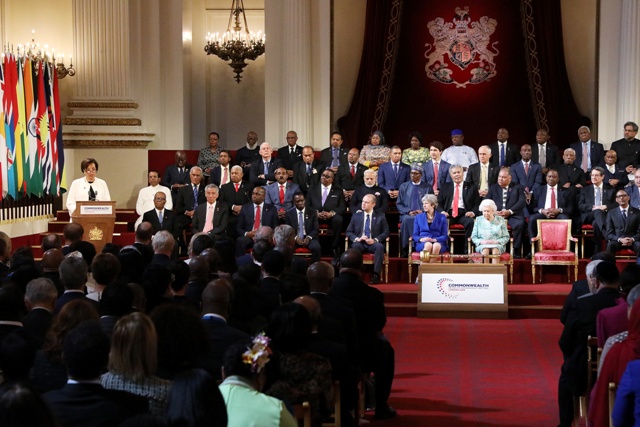 Current Secretary-General Patricia Scotland is "convincing in her case suggesting that the Commonwealth was about the present". [photo: CHOGM 2018 Flickr]
Current Secretary-General Patricia Scotland is "convincing in her case suggesting that the Commonwealth was about the present". [photo: CHOGM 2018 Flickr]
[This article appears in the latest issue of The Round Table: The Commonwealth Journal of International Affairs. Opinions expressed in blogs on this website do not reflect the position of the Round Table.]
In the weeks preceding the Commonwealth Heads of Government Meeting 2018 (CHOGM 2018), I was fortunate enough to have taken part in a conversation on Al Jazeera’s The Stream discussing the relevance of the Commonwealth. A range of issues came up, with some lively debate and differences of opinion, and a question that remained unanswered was not whether the Commonwealth was relevant but whether the Commonwealth could be ahistorical.
Baroness Patricia Scotland, the current secretary-general, was certainly convincing in her case suggesting that the Commonwealth was about the present. But until relations are genuinely decolonised, it is a disservice to the legacy of the institution to suggest that it can ignore its complicated history. The Commonwealth is, like any other supra-national organisation, reliant on idealism. Any form of international cooperation depends on the belief of an objective goodwill in the face of subjective circumstances. But it is vital that the Commonwealth not be framed the way that other cooperative spaces have been. Unlike blocs such as the European Union, the African Union, the South Asian Association for Regional Cooperation, or even the United Nations, the Commonwealth was founded on colonialism and control. At the tail end of imperialism as a form of governance, the organisation was founded to retain links forged in oppression and at the risk of disintegration through emancipation, based in no small part on misplaced nostalgia. Although many people across the nations of the organisation approach it with the kindest and most compassionate of intentions, considering it to be an ahistorical construct created in a vacuum is a form of neo-colonial oppression.
This is not to say that the Commonwealth cannot be a force for good or a force for liberation. At CHOGM 2018, advocacy and activist groups took part in ways unheard of even in the recent past. While many would probably focus on areas like the Economic Forum, it was the critical thinking in the Youth Forum that showed the future direction of the Commonwealth as a place both for healing and for forging new ties; and it would be foolish not to recognise the amazing work done by human rights defenders, feminists and LGBTQ+ activists this year.
The Royal Commonwealth Society is now part of a consortium of international human rights organisations alongside the Kaleidoscope Trust, Sisters Uncut and the Human Dignity Trust. This new Equality and Justice Alliance will be working with a £5.6 million programme to build more inclusive Commonwealth societies by supporting campaigns that seek to empower women and LGBTQ+ communities through the repeal of discriminatory laws and policies. It is a remarkable achievement indeed, working to break silences and finally uplift the voices of those left unheard in the push for competitive economic success. This is what it means not to leave anyone behind; minorities and marginalised communities are not hapless victims, but agents of change. Supporting them is the most powerful way to spread the democracy espoused by the Commonwealth.
But that democracy can only go so far if it is devoid of historical understanding. The Alliance would have no reason for existing if prejudicial laws and structural oppression had not been entrenched in the first place. This is where viewing the Commonwealth as ahistorical is not just incorrect but actively harmful. Colonialism was a toxic and destructive force. It exploited and caused untold damage – untold because its victims have been systemically buried and erased, not because we do not know how expansive the malign civilising mission was. And, unlike other periods of human depravity, the most worrying aspect of colonialism is how it continues to be revered.
Not only do many people continue to excuse it, including high-ranking government officials in both former coloniser and colonised nations, but there has been a recent trend in suggesting it should be reintroduced as a system. When scholar Bruce Gilley made a case for Europe recolonising Asia and Africa in Third World Quarterly, his now-removed argument was predicated on the dangerous misconception that the world was better then. It might have been for the West, but it certainly was not for the majority of the Commonwealth. Among the laws that permeated into many of these regions were penal code justifications for prejudicial policing, religious profiling, and criminalising homosexuality. The complementary work of Christian missionaries helped to make many of these moral judgements become part of social norms, which explains why parts of the world where queerness and women’s autonomy used to be diversely celebrated are now among the most misogynist and queerphobic.
The Commonwealth has proven to be a space where activists and radical thinkers can push for decolonial agendas with success. But it can never be an emancipatory institution in and of itself unless the status quo is willing not only to acknowledge and regret its past, but also to work to dismantle it. That the next head of the Commonwealth continues an outdated hereditary tradition instead of shifting the focus towards more diversity is symptomatic of this historical apathy. For the Commonwealth to have any integrity and survive, it must evolve. Decolonisation was started in the twentieth century; it must not stagnate.
Ibtisam Ahmed is a Researcher at the School of Politics and IR, University of Nottingham and a member of the Commonwealth Decriminalisation Campaign and Nottinghamshire Pride.



